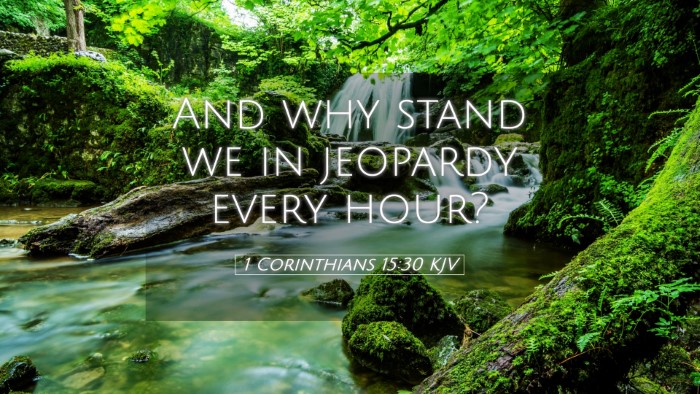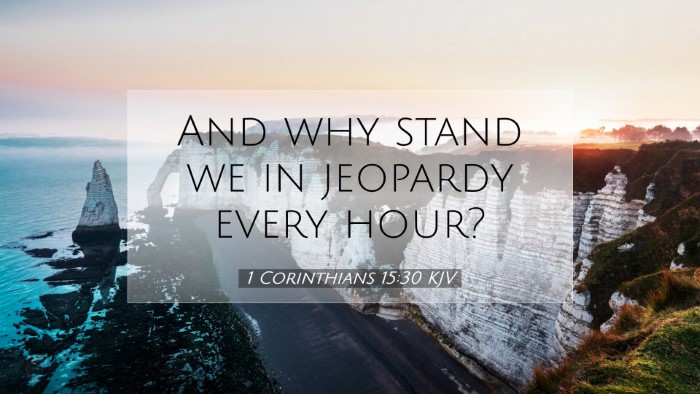Commentary on 1 Corinthians 15:30
Bible Verse: 1 Corinthians 15:30 - "And why stand we in jeopardy every hour?"
Introduction
This verse forms part of Paul's monumental discourse on the resurrection, emphasizing the implications of the resurrection for believers. The apostle transitions from the doctrines of resurrection into a personal appeal regarding his own struggles and the great stakes involved in preaching the Gospel.
Contextual Background
The Corinthian church was beset with various doctrinal misconceptions, particularly concerning the resurrection of the dead. Paul addresses these issues head-on, using logical reasoning to affirm the necessity of the resurrection not only for Christ but for all believers.
Exegesis and Analysis
-
Paul's Personal Jeopardy
Paul’s question, "Why stand we in jeopardy every hour?" reveals his own perilous situation as a messenger of the Gospel. The life of an apostle was fraught with danger, including persecution and martyrdom. From Matthew Henry's perspective, the question suggests that Paul's continual risk emphasizes the need for the truth of the resurrection; otherwise, such sacrifices would be meaningless.
-
The Theological Implication
From Albert Barnes' commentary, the implication is stark: if there is no resurrection, then the efforts and sufferings of the apostles and believers are in vain. In essence, Paul underlines the argument that if human beings were to face suffering with no ultimate hope of resurrection, it would render the Christian life of sacrifice illogical.
-
Paul's Suffering for Christ
Adam Clarke provides an insight into Paul’s sacrifice in spreading the Gospel. Paul points out that if he, and by extension others, faces death every day for a faith that lacks a resurrection promise, their lives would be utterly irrational. His ongoing peril becomes a testimony that proclaims the truth of his message—the resurrection is not just a doctrine but the very foundation of the Christian faith.
The Significance of Jeopardy
This "jeopardy" can be understood on multiple levels:
- Physical Jeopardy: The constant threat of persecution meant that Paul, like many early Christians, faced tangible dangers. His life was a manifestation of his faith's authenticity.
- Spiritual Jeopardy: The struggle against falsehoods that denied the resurrection posed a risk to the very fabric of Christian belief. The integrity of the Gospel hinges on the truth of Christ's victory over death.
Application for Believers
For pastors and theologians, this verse invites reflection on the cost of discipleship. As Matthew Henry asserts, each believer is also called to face various forms of jeopardy for their faith—whether it be social ostracism, moral dilemmas, or even life-threatening situations. This is not merely a historical reflection; it demands a practical application within the contemporary Christian life.
Moreover, the text offers encouragement to endure trials, knowing that every struggle has a purpose aligned with eternal hope through the resurrection of Christ.
Conclusion
In summary, 1 Corinthians 15:30 serves as a potent reminder of the realities faced by early Christians and the implications of their faith regarding the resurrection. Paul’s rhetorical question not only contextualizes his own sacrifices but challenges believers of all ages to consider the depth and seriousness of their commitment to Christ. The insights provided by public domain commentaries emphasize the foundational nature of resurrection theology in the Christian faith, making it essential for all scholars and pastors to engage with these truths actively and profoundly.


